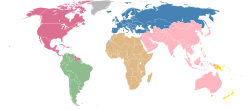Equipment

- Association football pitch – playing field.
- Football – ball used in the sport of association football. The ball's spherical shape, as well as its size, weight, and material composition, are specified by Law 2 of the Laws of the Game maintained by the International Football Association Board.
- Kit – standard equipment and attire worn by players.

